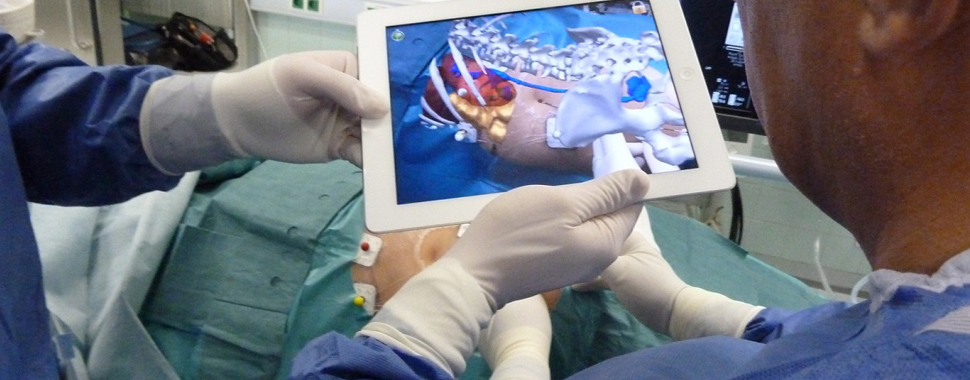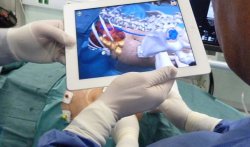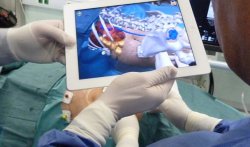This article originally featured on G7G20.
Augmented reality and virtual reality are gaining significant momentum. While virtual reality (VR) is based in an artificial and virtual world, augmented reality (AR) is a technology based in the physical world with additional layers of information shown in real-time.

Last year, Pokemon Go became a worldwide hit and made AR mainstream to consumers. While gaming has been a popular use of AR, there are much more practical and life changing applications particularly in advancing the medical field through a wide range of use cases which will unlock tremendous productivity.
According to Goldman Sachs, the healthcare market for VR/AR is currently $5.1b by 2025. As health costs continue to rise, AR will play a significant role to help prevent, manage and cure billions of people.
Current AR use cases include:
- surgery such as minimal invasive surgery
- training and educating doctors in a more immersive manner
- diagnosing patient better by overlaying medical record and scans, and
- detecting cancer through image recognition etc.
Some examples include AccuVein, ARnatomy, and Vipaarthough we are only on the cusp of breakout ideas and practical applications.
An area of health that’s not often discussed is mental health and illness, depression alone was estimated to cost US$800B in 2010 from the loss of economic output according to the World Bank. By integrating artificial intelligence (AI) with AR, the ability to detect and identify facial expressions, voice tones and physical behaviours can help families and doctors to detect signs of depression and other mental illness in real time. Brain Power, is an interesting startup that helps people with autism to teach themselves life skills and to measure their progress.
In the future, we will live in a world where everyone can to an extent, be their own doctors, which leads to better and more efficient medical care. CliniCloud, an Australian startup made the world’s first stethoscope for home use. Of course, there are cases where a professional is needed to diagnose but instant AR/VR telehealth tools will make the experience of going to a specialist much less awkward and less frustrating. Subscribing medication and treatments through the smartphone, smart glass or a wearable device will also be in a timely manner. Out of medication? Your smart device will automatically sense and send a notification to your local pharmacist or in the not too distant future, printing its own tablets through a 3D printer.
Underlying the remarkable progress in AR/VR and medtech in the last five years is the decades of research and development in AI, computing and graphics processing, software and the internet. The integration of such technologies will pay off exponentially for us all in the decades to come. It will also be more frightening if our health data are in the wrong hands and our governments do not protect our privacy and safety. With a blink of an eye, we could find our future soulmate’s biological and health information in front of our eyes. If we fail to create, standardise and follow an ethical code-of-conduct in regards to the handling of health and biological data, the world preempt by the film GATTACA might increasingly be a self-fulfilling prophecy where the unhealthy, poor, disadvantaged and genetically-unlucky are discriminated against. Proper and timely regulation of the use of data critical.
Nevertheless, there is more to be optimistic than pessimistic. Those in developing and emerging countries have the most to gain as such technologies can benefit many lives through the sheer scale of utilising smartphones, AR and AI. In a society where medical equipments are relatively much more expensive and doctors take a long time to train due to the lack of quality institutions, such advance in medicine will be a breakout opportunity towards higher living standards. As outlined in Bill and Melinda Gate’s 2017 letter to Warren Buffet , by reducing the costs of vaccines and other health barriers, 120 millions children's lives were saved since the 1990s. If every smartphone or wearable device ends up representing a doctor, health care costs will be tremendously lowered, billions of lives will be saved and our living standards to increase.
We should be determinately optimistic about our future. For thousands of years, homo sapiens have always, in an ingenious way, manage to solve complex problems and the advancement in AR technology and medicine will only bring us one step closer to finding the elixir of life. Still, technological disruptions will always brings unintended consequences as we’ve observed over the last year and as a global society, we must remain attentive of the ethical dilemmas that come with it.
Rachel Bui is the founder of Aires, an artificial intelligence lab and a co-founder of the Australia – Vietnam Leadership Dialogue. Rachel previously worked at muru-D, the start-up accelerator backed by Telstra, and at the Victorian Department of Treasury and Finance in Melbourne, Australia, where she worked on education reform, taxi deregulation, public transport and Plan Melbourne. She holds a B.Com (Hons) from Monash University. Rachel is a One Young World Ambassador and the Clinton Global Initiative University.


